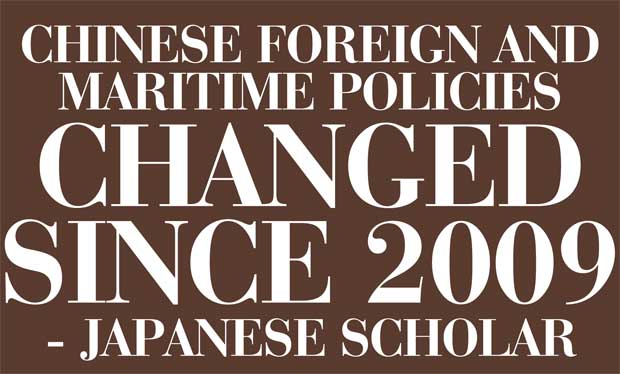Reply To:
Name - Reply Comment
Last Updated : 2024-04-20 00:00:00


Currently, the Chinese role is discussed and debated over plans by the government to hand over an 85% stake of the Hambantota Port to a Chinese Company named ‘China Merchants’. Against this backdrop, it looks pertinent to shed some light on the evolution of China’s foreign policy under the Private Public Partnership model.
Prof. Kawashima delivered a lecture titled “China’s foreign policy and India-Pacific Region” at the Lakshman Kadirgamar Institute of International Relations and Strategic Studies. In it, he described how China’s foreign policy, starting from modern diplomacy aimed at restoring national rights and territories, evolved over the decades. He said China focused socialist diplomacy between 1949 and 1970 and then diplomacy for between 1980 and 2008. Then, it evolved its diplomacy as a great power. According to this Japanese professor, China underwent transition from its main slogan after 1990s. It adopted the slogan ‘Hiding one’s talents and biding one’s time’.
He said China strengthened the importance of sovereignty and security, as well as development. That country displayed flexibility on territorial issues to some extent, like action plan in South China Sea in 2002. And China solved most of land territorial issues in 1990s.
“However, in 2006-2008, China adjusted its slogan. Then, prospect of Chinese economic growth indicated China changed to be a second largest economic power soon. And conservative socialists strengthened more aggressive foreign policy. Former Chinese President Wen Jiabao insisted on  keeping original policy, because he thought China still needed economic growth,” he said.
keeping original policy, because he thought China still needed economic growth,” he said.
He said, in 2009, Chinese foreign and maritime policies apparently changed.
“Historically, China is a land power, though China sent Zheng He in Ming dynasty. And PRC and PLA basically made land-based nation-building. But China needs to protect its coastal area that is the centre of industries and the richest in China, and has to keep its sea lane of resources and security. China also signed and ratified the UN Convention on the Law of the Sea, but it has a unique concept about the sea, like blue territory,” he said.
Referring to current President Xi Jingping’s administration, foreign policy he said “Xi is conscious that China is the second largest power in the world, but simultaneously understands it’s difficult for China to be a global super power soon,” he said.
Commenting on President Xi’s approach on Asia, he said Xi proposed the concept of Asia, on New Concept of Asian Security. This concept excludes USA, and strengthens Chinese initiative. Xi’s China provides a series of regional common goods, like AIIB, as a great power in this region.
Such a strategy has a domestic background. China has to express CCP realized “greater China” to keep its legitimacy, and has to cope with the problems of over production and national enterprises,” he said.
In the light of such comments and remarks by the Japanese scholar, China’s present engagements with Sri Lanka look bent more on economic and maritime cooperation. It launched its global trade expansion project called ‘One belt, one route’ in 2013. It is even called the 21st century maritime silk route, modelled on the ancient silk route that facilitated trade across the globe. Hambantota Port is located just four nautical miles off the main trade artery that carries a bulk of products manufactured in the countries such as South Korea, Japan, and China etc to the markets in the Middle East or the western world. Alongside, it is a key trade link supplying much needed fuel from the Middle East to the other side. So, a port in Hambantota will be important, mainly in the provision of services to the ships passing by.
However, the signing of the agreement for the port project has been postponed indefinitely amidst pressure emanating from various quotes. It is learnt that Sri Lanka Freedom Party (SLFP) headed by President Maithripala Sirisena is not in favour of the criterion adopted in leasing out the port. Instead of an 85% stake, the President’s SLFP is for a lesser percentage for the Chinese company. Also, the public protest has built up against the acquisition of land on a large scale for the port related industrial zone.
In the meantime, the Joint Opposition, acting under the leadership of former President Mahinda Rajapaksa also requested the President in writing to postpone the signing of the agreement.
It outlined the following reasons for it:
1 The Sri Lanka Ports Authority (SLPA), in September 2014, entered into an agreement with the China Merchant Holdings (International) Company Ltd, and China Harbour Engineering Company Ltd, to lease the Hambantota Port (Phase II) on a supply, operate and transfer (SOT) basis for 35 years. However, this agreement was nullified. Subsequently, China Harbour Engineering Company Ltd, and China Merchant Ports Holding Company Ltd, tendered separate proposals without the criteria for their selection having been defined.
2 China Harbour Engineering Company Ltd proposed an initial payment of approximately US$ 730 million for a 50-year lease period, during which a payment structure similar to a royalty was proposed, which made the value of this proposal in fact US$ 1.5 billion. This was reportedly the option preferred by the SLPA, which would have benefited the country and the SLPA. However, the option selected was the proposal of China Merchant Ports Holding Company, for a one-time payment of US$ 1.08 billion, for a 99-year lease, extendable for a further 99 years. The question arises as to why China Merchant Ports Holding Company was selected, and who selected it.
3 The project has been valued at US$ 1.4 billion by the SLPA. The question arises as to what basis was used to arrive at this figure. As far as we know, no proper valuation has been done of the Hambantota Port facilities, infrastructure and land (including the 110 acre island), but only construction costs have been taken into consideration, so the agreement is based on an undervaluation of the assets.
4 The Attorney General has given his opinion that articles 4, 5, 8 and 16 of the agreement are beyond the scope and/or the statutory powers vested with the SLPA.
5 The China Merchant Ports Holding Company Ltd has agreed to invest US$ 1.12 billion in the joint venture project, paying US$ 5 million as a security deposit, 10% of the investment value, including the security deposit, within one month; 30% of the investment value within 3 months and 60% of the investment value within 6 months. According to the agreement, these funds are to be invested in the project itself. The Government of Sri Lanka (GoSL) has agreed to be responsible for the debts of the SLPA, so the joint venture will not be responsible – in the event of the project going bankrupt, GoSL would still have to pay the debts.
6 The SLPA suggested a share split in the original proposed joint venture company, , but this was subsequently changed by the Government to 80% to China Merchant Ports Holding Company Ltd and 20% to the SLPA. The question arises as to how, why and on what basis all these critical calculations and changes were made by the Government.
7 No proper due diligence has been carried out on the project.
8 The Cabinet Appointed Negotiating Committee (CANC) was not given sufficient time and had not followed laid down procedures to study the proposals and make adequate recommendations.
9 Granting of 15,000 acres adjacent to the Hambantota Port which would deprive farmers of their lands have no justification.
10 The SLPA Board cannot give its approval to the project and above mentioned according to the SLPA Act.
The JOT wrote, “It is proposed to grant a lease of the Hambantota Port to the China Merchant Ports Holding Company for 99 years + 99 years, totalling up to 198 years. Such a vital asset should not be entered into lightly, and should be given due consideration.”

Add comment
Comments will be edited (grammar, spelling and slang) and authorized at the discretion of Daily Mirror online. The website also has the right not to publish selected comments.
Reply To:
Name - Reply Comment
On March 26, a couple arriving from Thailand was arrested with 88 live animal
According to villagers from Naula-Moragolla out of 105 families 80 can afford
Is the situation in Sri Lanka so grim that locals harbour hope that they coul
A recent post on social media revealed that three purple-faced langurs near t